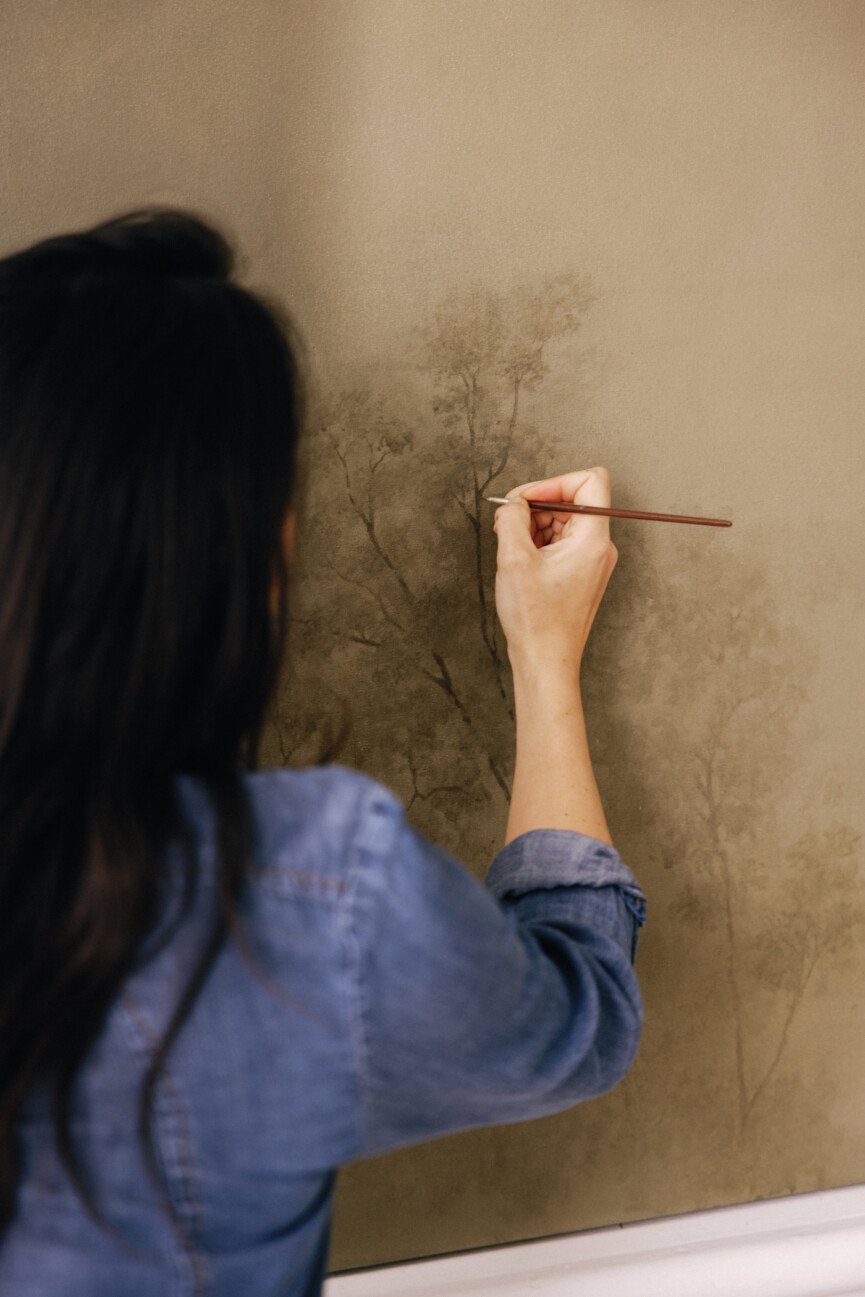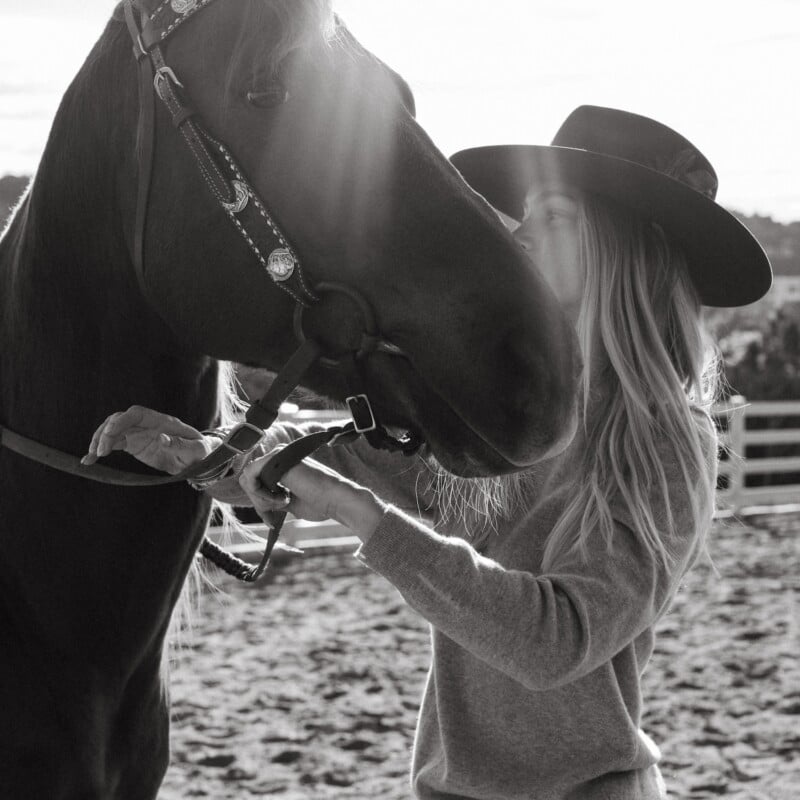In Italy, my adopted home, there’s a word I keep coming back to—one I first discovered randomly as I flipped open an old Italian dictionary, always landing on the same well-worn page. Rinselvatichire. There isn’t an exact translation in English, but it essentially means “rewilding,” “to become wild again,” or “to rewild oneself.” It’s like a divine force conspired to constantly bring this word to my attention, nudging me toward the idea there was something I had to unlearn, some way to recondition myself to what I’ve always known, just maybe had forgotten.
It could be the tension of modern life that makes this concept so appealing now: to shed the shackles of screens, routines, demands, and remember the wildness at the heart of every soul. I think about rinselvatichire whenever I see old ruins that have been reclaimed by vines and weeds: that what is temporary can point to the eternal. And what’s eternal can be felt in our bones.
Feature image from our Wake-Up Call with Mari Llewellyn.

Why Many of Us Are Craving Wildness
It doesn’t take much to realize “frayed” is the sentiment of the day. The reasons are endless, and the distractions are too. Our nervous systems weren’t built for the kind of constant activation most of us receive, and the rush of modern life can pull us further from our bodies, our rhythms, and the earth beneath our feet. It’s true we’re more connected than ever—and it’s also true that connection is rarely to our ourselves.
That’s where the concept of rewilding enters as a kind of balm for the soul. While the term is often used in ecological restoration, human rewilding is about returning to a more natural state of being. Studies show that regular time in green spaces reduces cortisol levels, lowers heart rate, and improves focus and mood. It supports nervous system regulation, especially in a culture where stress and overwhelm are the norm. When we seek out moments of stillness coupled with spatial awareness, something physiological and spiritual happens. The wild within awakens.
Everyday Practices to Rewild Your Body and Mind
Practicing rinselvatichire has become a daily pursuit of mine. I’ve been seeking out small acts of rebellion, little moments that can protect the sacred parts of myself rather than trying to tame them. To remember life isn’t measured by output, but in experience, is the goal. It’s about restoring balance in what commands my attention, tuning into a deeper, more analog way of life despite the need to work, interact, and connect digitally.
Go barefoot in the grass (or sand, or dirt).
This simple act, known as earthing or grounding, helps regulate your nervous system, reduce inflammation, and increase feelings of calm. Going barefoot is a good reminder that we weren’t born with shoes on, and that there’s something akin to coming home when we feel that in our soles.
Shell peas or shuck corn from the market.
After recently getting a giant bag of vibrant green sweet peas, I forgot how meditative the tactical act of shelling could be. Ancestral tasks, ones that invite slowness and presence, can ground us in time and tradition. To let the act of cooking begin there, at the table, is to remember how many before us have done the same thing.
Swim in a natural body of water.
Skip the chlorinated pool and seek out a lake, creek, or ocean to reinvigorate the senses—or to escape from the heat. You’ll be reminded that not everything is about room-temperature comfort and instead, direct communion with the elements is a rare gift enjoyed by the willing. The earth gives us what we need.
Take an evening hike under the stars.
Let your body adjust to the quiet of the dark. Whether it’s a gentle stroll or a mindful trail hike, time in nature after sunset taps into something ancient and awe-filled. This can be a welcome reset after a day desensitized by screens and blue light—allowing your subtler senses to come to life and capture what you’d otherwise miss.
Climb a tree or balance on a log.
Yes, even as an adult. For many, trees were our first babysitters, or maybe even best friends. Reclaim play as a form of movement and presence, not to mention the health benefits of breathing in forest air. Curiosity, agility, and connecting to the physical body is rewilding in a nutshell, drawing us beyond our safe zones to explore an untapped world.
Eat outside with your hands.
Get messy. Taste food. Whether it’s a peach, a piece of bread, or a gloriously overstuffed burrito, there’s a primal joy and intimacy with meals that require both hands. I don’t have data to support this, but I swear it’s those bites that exchange elegance for enjoyment, oozing a medley of flavor, that somehow taste the best. Manners have their place, but sometimes you just need to dive in.
Let your hair dry in the wind.
The best products can’t compete with how my hair looks, air-dried, after a day at the beach. Even if it’s just stepping outside after a shower or using a towel dried in the sun, there’s something deeply liberating about letting the elements care for you. It’s an act of surrender—and trust—to be exactly as you are.
Rewilding in the Middle of a Busy Life
One last thing I’ll mention: Rewilding isn’t about the radical uprooting. It’s not about forgoing hygiene or becoming brutish in relationships, but about saving space in busy schedules for what truly makes us feel alive.
Here are a few ways to start:
- Wake up 15 minutes earlier for a barefoot walk. Whether it’s outside in your backyard or simply on your front porch. Feel the breeze and vitamin D before consuming from a screen.
- Set a weekly “wild hour” with no devices. No scrolling, no emails, no background noise. Instead, sit outside. Journal. Forage herbs. Nap in the sun. This hour doesn’t need to be productive; its only to invite presence.
- Bring a natural element indoors. Arrange wildflowers in a jar. Display gathered stones or driftwood. Dry herbs from your garden or light a beeswax candle. These tiny touches remind us of the beauty that exists without our making, and keep us rooted in the now.
These small, sensory moments are anchors to our aliveness—irreplaceable and deeply human. Living in the age of AI, the speed at which automation and distraction will become ordinary ways of life will only continue to rise. In kind, so will our need to remember what technology can’t replicate. It’s the scent of tomatoes warmed by the sun. The sound of your own breath as you walk through the woods. A loved one’s hand as it finds yours. These are how we find our way back to the wild.






